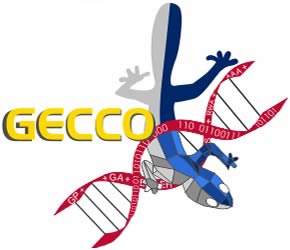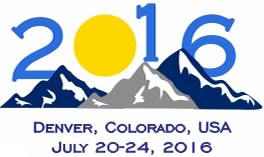The Challenges of Natural Algorithms
9:00am-10:10am Friday, July 22, 2016 (Grand Mesa Ballroom DEF)
Download the poster
Abstract:
This talk will sketch an algorithmic approach to the dynamics of living systems. Our working models consist of entropy-producing dissipative dynamic networks driven by a supply of free energy. They can be found in opinion dynamics, synchronization systems, as well as many evolutionary contexts. The main challenge posed by these natural algorithms is the dearth of analytical tools currently at our disposal. The focus of our work has been on building a new theory of endogenously-driven dynamic networks rich enough to allow for the renormalization of large-scale systems. The main novelty of our approach to dynamical systems is to make algorithms the centerpiece of the analysis.
Biosketch
Bernard Chazelle is Eugene Higgins Professor of Computer Science at Princeton University, where he has been on the faculty since 1986. His current research focuses on the “algorithmic nature” of living systems. A professor at the Collège de France in Paris in recent years as well as a member of the Institute for Advanced Study in Princeton, he received his Ph.D in computer science from Yale University in 1980. The author of the book, "The Discrepancy Method," he is a fellow of the American Academy of Arts and Sciences, the European Academy of Sciences, and the recipients of three Best-Paper awards from SIAM.
Taming the Complexity Monster or: How I learned to Stop Worrying and Love Hard Problems
9:00am-10:10am Saturday, July 23, 2016 (Grand Mesa Ballroom DEF)
Download the poster
Abstract:
We live in interesting times - as individuals, as members of various communities and organisations, and as inhabitants of planet Earth, we face many challenges, ranging from climate change to resource limitations, from market risks and uncertainties to complex diseases. To some extent, these challenges arise from the complexity of the systems we are dealing with and of the problems that arise from understanding, modelling and controlling these systems. As computing scientists and IT professionals, we have much to contribute: solving complex problems by means of computer systems, software and algorithms is an important part of what our field is about.
In this talk, I will focus on one particular type of complexity that has been of central interest to the evolutionary computation community, to artificial intelligence and far beyond, namely computational complexity, and in particular, NP-hardness. I will investigate the question to which extent NP-hard problems are as formidable as is often thought, and present an overview of several directions of research that aim to characterise and improve the behaviour of cutting-edge algorithms for solving NP hard problems in a pragmatic, yet principled way. For prominent problems ranging from propositional satisfiability (SAT) to TSP and from AI planning to mixed integer programming (MIP), I will demonstrate how automated analysis and design techniques can be used to model and enhance the performance characteristics of cutting-edge solvers, sharing some surprising insights along the way.
Biosketch
Holger H. Hoos is a Professor of Computer Science and a Faculty Associate at the Peter Wall Institute for Advanced Studies at the University of British Columbia (Canada). His main research interests span empirical algorithmics, artificial intelligence, bioinformatics and computer music. He is known for his work on the automated design of high-performance algorithms and on stochastic local search methods. Holger is a co-author of the book "Stochastic Local Search: Foundations and Applications", and his research has been published in numerous book chapters, journals, and at major conferences in artificial intelligence, operations research, molecular biology and computer music. Holger was elected a Fellow of the Association for the Advancement of Artificial Intelligence (AAAI) in 2015 and won two prestigious IJCAI/JAIR best paper prizes in 2009 and 2010. He is a past president of the Canadian Artificial Intelligence Association / Association pour l'intelligence artificielle au Canada (CAIAC) and Associate Editor of the Journal of Artificial Intelligence Research (JAIR). Recently, his group has helped UBC to produce better exam timetables, Actenum Inc. to increase production efficiency in the oil and gas industry, and IBM to improve their CPLEX optimisation software, which is used by 50% of the world's largest companies and thousands of universities.
SIGEVO Plenary Lecture in Memory of John Holland: The Biology of Software
11:10am-11:55am Sunday, July 24, 2016 (Grand Mesa Ballroom DEF)
Download the poster
Abstract:
Biological design principles can potentially change the way we study, engineer, maintain, and develop large dynamic software systems. For example, computer programmers like to think of software as the product of intelligent design, carefully crafted to meet wellspecified goals. In reality, large software systems evolve inadvertently through the actions of many individual programmers, often leading to unanticipated consequences. Because software is subject to constraints similar to those faced by evolving biological systems, we have much to gain by viewing software through the lens of biology. The talk will highlight how abstractions of biological processes can lead to new computational algorithms and engineering principles using examples from my own research. Specifically, it will show how the biological concepts of Darwinian evolution and immunology can be applied to problems such as repairing software bugs and cybersecurity.
The lecture is dedicated to John H. Holland, whose lifelong study of the mechanisms that produce adaptive behavior in complex systems left an intellectual legacy that will guide research in intelligent and complex systems for many years to come.
Biosketch
Stephanie Forrest is the Regents Distinguished Professor of Computer Science at the University of New Mexico in Albuquerque. She is renowned for her work in adaptive systems, including genetic algorithms, computational immunology, biological modeling, automated software repair, and computer security. Her research accomplishments include developing the first practical anomaly intrusiondetection system; designing automated responses to cyber attacks; writing an early influential paper proposing automatic diversity and introducing instructionset randomization as a particular implementation; developing noncryptographic privacy enhancing data representations; agentbased modeling of largescale computational networks; and recently, work on automated repair of security vulnerabilities. She has conducted many computational modeling projects in biology, where her specialties are immunology and evolutionary diseases, such as influenza and cancer.
A University of Michigan alum and doctoral student of John Holland, Prof. Forrest was awarded the NSF Presidential Young Investigator Award in 1991, the IFIP TC2 Manfred Paul Award for Excellence in Software in 2009, and the ACM AAAI Allen Newell Award in in 2011. She is an I.E.E.E. Fellow. She has contributed exemplary leadership to the Evolutionary Computation community, SIGEVO and GECCO. She served as ICGA Chair in 1993, was elected a Senior Fellow of the International Society for Genetic and Evolutionary Computation in 2003, shared the ACM SIGEVO GECCO Impact Award in 2009 (for a paper published in 1999), shared the gold award in the 2009 HUMIES competition and the bronze award in 2012 and served on the editorial board of Evolutioanry Computation. An outstanding ambassador for evolutionary computation, she has won highly regarded paper awards at the International Conference on Software Engineering (2009 and 2012), held an appointment as Senior Science Advisor for Communication and Information Policy at the U.S. Dept. of State (20132014), cochaired the Science Board of the Santa Fe Institute (20102013, was a member of the DARPA Information Science and Technology (ISAT) advisory group (20012004) and held a Jefferson Science Fellowship of the USA National Academies of Science and Engineering (20132014).






